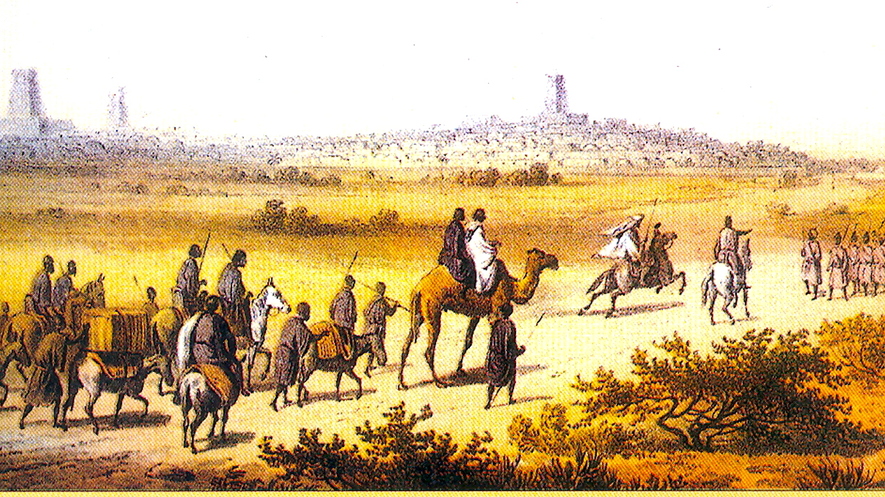Between the 9th and 11th centuries A.D., the kingdom of Ghana was rich. So rich, in fact, that its dogs wore golden collars and its horses wore silken rope halters and slept on plush carpets. Based on animal luxuries alone, it is no wonder that foreigners touted Ghana's kings as the richest men in the world. Certainly they were living the high life, but how did they do it?
Today, there is a country named Ghana in western Africa. It is named after the ancient kingdom of Ghana. But the ancient kingdom of Ghana was in a different place. The ancient kingdom of Ghana is located within today's borders of Mauritania, Mali and Senegal in western Africa. Back then, this land had an abundance of resources and Ghana literally sat on a gold mine. This allowed Ghana's rulers to trade for many years.
Its leaders' actions and the country's great location led to Ghana becoming very wealthy.
Ancient Ghana
Ancient Ghana was called Wagadugu, Wagadou or Awkar. Most of what is known of the country back then is based on writings of Arab travelers who came in contact with the nation's peoples. "Ghana" was actually the title given to Wagadugu kings and was used by the Islamic writers to describe the rich and mysterious place they observed.
Evidence of Ghana's occupation dates back to the 4th century. It was several hundred years later that it became established as a nation by a tribe known as the Soninke. The Soninke leaders have been credited with the early strengthening of Wagadugu and the expansion of its territories.
By 1000 B.C., the nation had undergone an important expansion. Its rulers had taken control of the land between the upper Niger and Senegal Rivers, which was rich in gold. Having control of this land meant that Ghana would become a leading force in the trans-Saharan trade network. This was a trade route the went across the Sahara Desert.
The king was in charge of everything
The leader with the most power was the king, who was also known as the ghana, or war chief, and his word was law. He served as the commander in chief of a highly organized army, the controller of all trade activities and the head administrator of justice. Other leaders included mayors, civil servants, counselors and ministers. They were appointed by the king to assist with administrative duties, but at all times, the king was in charge.
![King Musa of Mali holding a gold coin. At the time of Musa's rise to the throne in the 1300s, the Malian Empire consisted of territory formerly belonging to the Ghana Empire. Image from the Catalan Atlas of 1375. Photo from Wikimedia. [click to enlarge]](https://media.newsela.com/article_media/extra/AfricanKingfromCatalanAtlas1375.jpg)
Each day, the king assembled his court and allowed people to publicly voice their complaints. Beating drums signaled that people should gather to speak their minds about neighborly conflicts or cases of violated rights. The king listened to the complaints and gave his judgment.
Such hearings were reportedly peaceful unless they involved issues of criminal nature. Two of the most serious criminal offenses were the denial of debt and the shedding of blood. These crimes were tried by ordeal, which means the person would be tested in a painful way to determine if he was guilty.
To vomit or not to vomit?
For example, the criminally accused was given a drink made from sour and bitter-tasting wood and water. If he vomited after drinking the nasty brew, he was declared innocent. If he did not vomit, he was considered guilty as charged and suffered the king's wrath.
The people of Ghana were not the only ones put to the king's test. People who lived in Ghana's conquered lands were examined for their good behavior and loyalty as well. In territories where order and obedience prevailed, and taxes were properly paid, some independence was granted. But in other areas, Ghanaian governors were appointed as watchdogs and reported almost everything to the king.
Trade with the Arabs was profitable
The king of Ghana also used his power to spread international trade. At its peak, Ghana was chiefly bartering gold, ivory and slaves for salt from Arabs and horses, cloth, swords and books from North Africans and Europeans.
![Trans-Saharan medieval trade routes. Photo from Wikimedia. [click to enlarge]](https://media.newsela.com/article_media/extra/AfricaMedievalTradeRoutes.jpg)
Back then, salt was worth its weight in gold. Because gold was so abundant in the kingdom, Ghana achieved much of its wealth through trade with the Arabs. Islamic merchants traveled over two months through the desert to reach Ghana to trade. They were taxed for both what they brought in and what they took out. With this system, it is no wonder that Ghana got rich quickly. The wealth that the kingdom acquired did not, however, serve in its favor forever. Competition from other states in the gold trade eventually took its toll.
Ghana's capital city was invaded
Jealousy, fear and anger of Ghana's power prompted its neighbors to stand up against the kingdom. Their efforts were at first weak and insignificant. But, by the mid-11th century, a Muslim empire led by a dynasty known as the Almoravids invaded Ghana's capital city of Koumbi Saleh. The Almoravids controlled North Africa and had their base in the area now called Morocco. Some of Ghana's territories were seized and the government had to pay taxes to the Almoravids. But, Ghana eventually recovered and forced the invaders to withdraw.
A little less than 200 years later, however, Ghana was not so lucky. The kingdom was weakened by attacks and cut off from international trade, making it vulnerable and unable to prevent defeat.
In A.D. 1240, Ghana was absorbed into the growing nation of Mali, which would soon become the next great empire.
